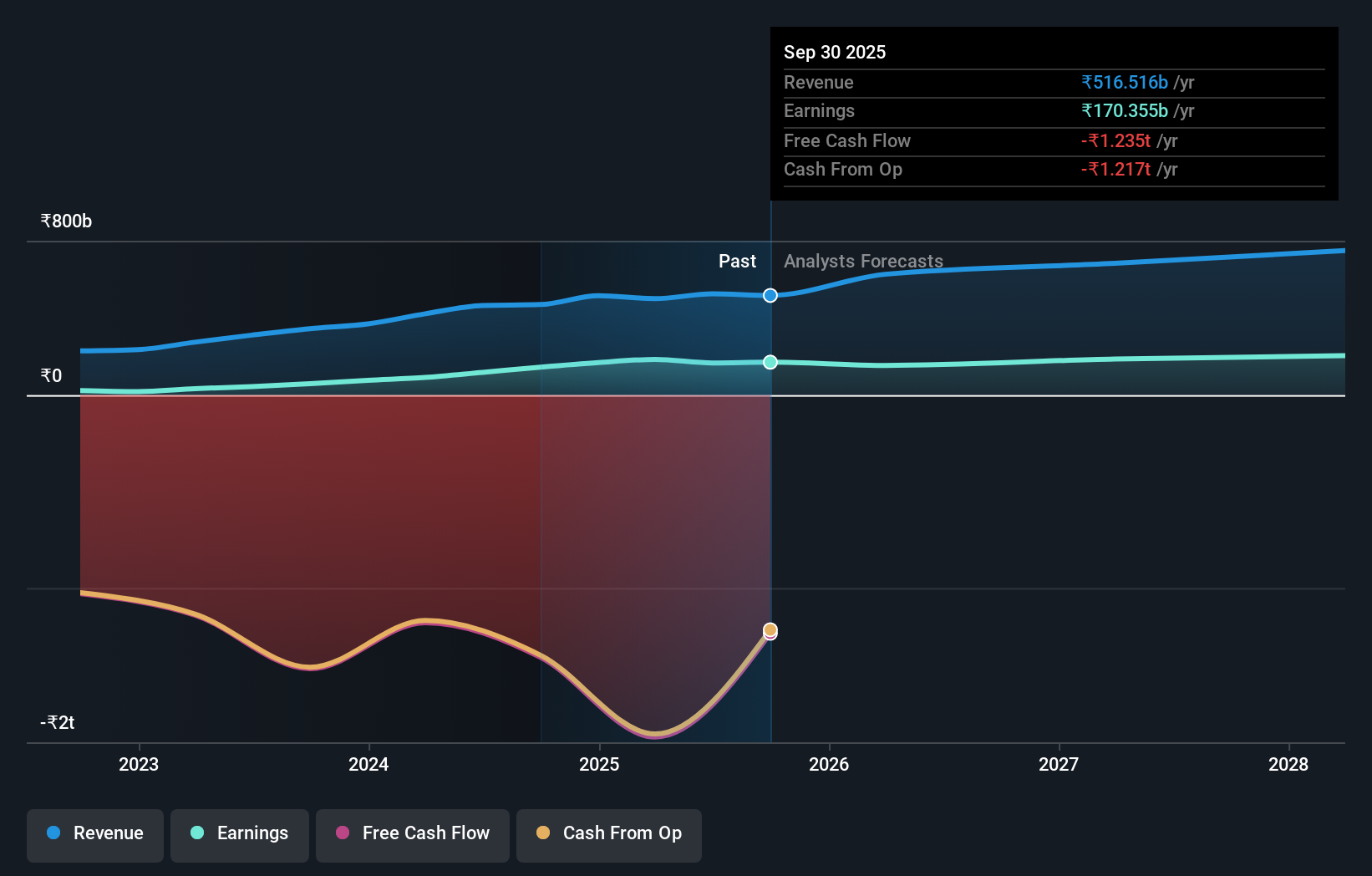State or government who have a significant stake must be disappointed along with institutions after Punjab National Bank's (NSE:PNB) market cap dropped by ₹41b
Key Insights
- Significant control over Punjab National Bank by state or government implies that the general public has more power to influence management and governance-related decisions
- The largest shareholder of the company is The Government of India with a 70% stake
- Institutional ownership in Punjab National Bank is 20%
To get a sense of who is truly in control of Punjab National Bank (NSE:PNB), it is important to understand the ownership structure of the business. The group holding the most number of shares in the company, around 70% to be precise, is state or government. Put another way, the group faces the maximum upside potential (or downside risk).
While the holdings of state or government took a hit after last week’s 3.0% price drop, institutions with their 20% holdings also suffered.
Let's delve deeper into each type of owner of Punjab National Bank, beginning with the chart below.
View our latest analysis for Punjab National Bank

What Does The Institutional Ownership Tell Us About Punjab National Bank?
Institutional investors commonly compare their own returns to the returns of a commonly followed index. So they generally do consider buying larger companies that are included in the relevant benchmark index.
Punjab National Bank already has institutions on the share registry. Indeed, they own a respectable stake in the company. This implies the analysts working for those institutions have looked at the stock and they like it. But just like anyone else, they could be wrong. It is not uncommon to see a big share price drop if two large institutional investors try to sell out of a stock at the same time. So it is worth checking the past earnings trajectory of Punjab National Bank, (below). Of course, keep in mind that there are other factors to consider, too.

We note that hedge funds don't have a meaningful investment in Punjab National Bank. The Government of India is currently the largest shareholder, with 70% of shares outstanding. This implies that they have majority interest control of the future of the company. LIC Mutual Fund Asset Management Company Ltd. is the second largest shareholder owning 9.2% of common stock, and SBI Funds Management Limited holds about 2.4% of the company stock.
Researching institutional ownership is a good way to gauge and filter a stock's expected performance. The same can be achieved by studying analyst sentiments. Quite a few analysts cover the stock, so you could look into forecast growth quite easily.
Insider Ownership Of Punjab National Bank
The definition of company insiders can be subjective and does vary between jurisdictions. Our data reflects individual insiders, capturing board members at the very least. The company management answer to the board and the latter should represent the interests of shareholders. Notably, sometimes top-level managers are on the board themselves.
Most consider insider ownership a positive because it can indicate the board is well aligned with other shareholders. However, on some occasions too much power is concentrated within this group.
Our information suggests that Punjab National Bank insiders own under 1% of the company. Being so large, we would not expect insiders to own a large proportion of the stock. Collectively, they own ₹1.8m of stock. It is always good to see at least some insider ownership, but it might be worth checking if those insiders have been selling.
General Public Ownership
The general public-- including retail investors -- own 10% stake in the company, and hence can't easily be ignored. This size of ownership, while considerable, may not be enough to change company policy if the decision is not in sync with other large shareholders.
Next Steps:
I find it very interesting to look at who exactly owns a company. But to truly gain insight, we need to consider other information, too. For instance, we've identified 1 warning sign for Punjab National Bank that you should be aware of.
But ultimately it is the future, not the past, that will determine how well the owners of this business will do. Therefore we think it advisable to take a look at this free report showing whether analysts are predicting a brighter future.
NB: Figures in this article are calculated using data from the last twelve months, which refer to the 12-month period ending on the last date of the month the financial statement is dated. This may not be consistent with full year annual report figures.
New: Manage All Your Stock Portfolios in One Place
We've created the ultimate portfolio companion for stock investors, and it's free.
• Connect an unlimited number of Portfolios and see your total in one currency
• Be alerted to new Warning Signs or Risks via email or mobile
• Track the Fair Value of your stocks
Have feedback on this article? Concerned about the content? Get in touch with us directly. Alternatively, email editorial-team (at) simplywallst.com.
This article by Simply Wall St is general in nature. We provide commentary based on historical data and analyst forecasts only using an unbiased methodology and our articles are not intended to be financial advice. It does not constitute a recommendation to buy or sell any stock, and does not take account of your objectives, or your financial situation. We aim to bring you long-term focused analysis driven by fundamental data. Note that our analysis may not factor in the latest price-sensitive company announcements or qualitative material. Simply Wall St has no position in any stocks mentioned.
About NSEI:PNB
Punjab National Bank
Provides various banking and financial products and services in India and internationally.
Proven track record with adequate balance sheet and pays a dividend.
Similar Companies
Market Insights
Community Narratives



